2023
2022
2021
2020
The series “Schriften des Institutum Judaicum Delitzschianum” is now called “Ioudaioi”
In the meantime, the series Schriften des Institutum Judaicum Delitzschianum has been reorganised. From vol. 11 onwards, the series has an international focus and is edited by Professor Lutz Doering in conjunction with an international advisory board. Monographs and collective volumes on Judaism from antiquity to the early modern period as well as works on Christian-Jewish relations of the same periods are published. Volumes are published in English or German.
The first in the renewed series is the collective volume on synagogues in the Hellenistic and Roman eras mentioned in the previous announcement, which presents new finds and combines contributions on the interpretation of the material and literary findings with reflections on the character, functions and contexts of early synagogues: Synagogues in the Hellenistic and Roman Periods: Archaeological Finds, New Methods, New Theories Eds. Lutz Doering and Andrew R. Krause, in co-operation with Hermut Löhr. Ioudaioi 11. Göttingen: Vandenhoeck & Ruprecht, 2020.
The second volume in the renewed series is a monograph by Professor Agnethe Siquans (University of Vienna): Agnethe Siquans, Der gerettete Retter. Exodus 1–2 inm patristischer und rabbinischer Interpretation. Ioudaioi 12. Göttingen: Vandenhoeck & Ruprecht, 2021.
A volume on Jewish numismatics by Professor emeritus Max Küchler (Université de Fribourg) has already been announced.
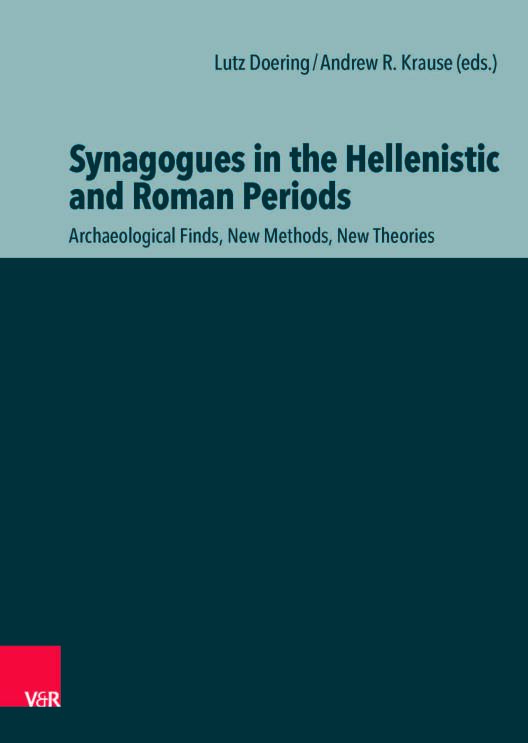
© Vandenhoeck und Ruprecht Collective volume on Synagogues in the Hellenistic and Roman Periods Published
In December 2020, the collective volume, Synagogues in the Hellenistic and Roman Periods: Archaeological Finds, New Methods, New Theories, edited by Professor Lutz Doering together with Dr Andrew Krause (now ACTS Seminaries, Vancouver, Canada) and Professor Hermut Löhr (now University of Bonn), was published. The volume is part of the publications of the research project EXC 212 C2-24 – Integration and Diversification in the Judaism of Palestine during the Hellenistic-Early Roman Period (300 BC–135 CE) in the Cluster of Excellence Religion and Politics (2014-2018) and is based on an international conference in 2017.
The study of ancient Judaism has enjoyed a steep rise in interest and publications in recent decades. However, much of this study has focused on the ideas and beliefs represented in ancient texts, with only limited study regarding the daily lives and material culture of Jewish individuals and their communities. The nascent institution of the synagogue formed an increasingly important venue for communal gathering and daily or weekly practice. This collection of essays is intended to bring together a broad spectrum of new archaeological and textual data with various emergent theories and interpretive methods in order to address the need to understand the place of the synagogue in the daily and weekly procedures, community frameworks, and theological structures in which Judaeans, Galileans, and Jewish people in the Diaspora lived and gathered. The interdisciplinary studies will be of great significance for anyone studying ancient Jewish belief, practice, and community formation.
This is the first volume of the series Schriften des IJD, published under the new series title Ioudaioi by Vandenhoeck & Ruprecht. The series is edited by Lutz Doering in conjunction with an international advisory board.
Synagogues in the Hellenistic and Roman Periods: Archaeological Finds, New Methods, New Theories Eds. Lutz Doering and Andrew R. Krause, in co-operation with Hermut Löhr. Ioudaioi 11. Göttingen: Vandenhoeck & Ruprecht, 2020.
Contents:
Lutz Doering and Andrew R. Krause, Introduction: Synagogues in the Hellenistic and Roman PeriodsI. Advances in the Archaeology of Synagogues from the Hellenistic and Roman Periods
Zeev Weiss, The Synagogue in an Age of Transition, from the Second Temple Period to Roman Times: Recent Developments in Research
Uzi Leibner, The Dating of the “Galilean”-Type Synagogues: Khirbet Wadi amam as a Case-Study
Mechael Osband and Benjamin Arubas, The Discovery of a Roman Period Synagogue in the Golan at Majduliyya
Monika Trümper, The Synagogue in Delos RevisitedII. Interpreting Material Remains and Literary Sources
Lutz Doering, The Synagogue at Magdala: Between Localized Practice and Reference to the Temple
Judith H. Newman, Contextualizing the Magdala Synagogue Stone in its Place: An Exercise in Liturgical Imagination
Andrew R. Krause, The Rhetoric of Synagogue Space: Theoretical Issues in the Study of Jewish Institutions in Literary Sources
Jordan J. Ryan, The Contributions of Historical and Archaeological Study of Early Synagogues to Historical Jesus ResearchIII. Theorizing Practice in Ancient Synagogues
Jutta Leonhardt-Balzer, What Were They Doing in Second Temple Synagogues? Philo and the προσευχή
Hermut Löhr, In Search of the Petichah: Some Thoughts on the Torah, the Prophets, and the Scriptures in the Synagogues and Beyond
Ruth Langer, Rabbis, Nonrabbis, and Synagogues in Roman Palestine: Theory and Reality
Clemens Leonhard, The Origins of Torah Reading as a Ritual and its Social ContextIV. Legal, Political, and Cultural Contexts of Ancient Synagogues
Kimberley Czajkowski, “Synagogues” in Ptolemaic and Early Roman Egypt
Benedikt Eckhardt, Synagogues as Associations in the Roman Empire
Markus Öhler, Synagogues in Inscriptions from Asia Minor: The Iulia Severa Inscription Reconsidered
Katrin Kogman-Appel, Dress Codes in the Synagogue of Dura Europos?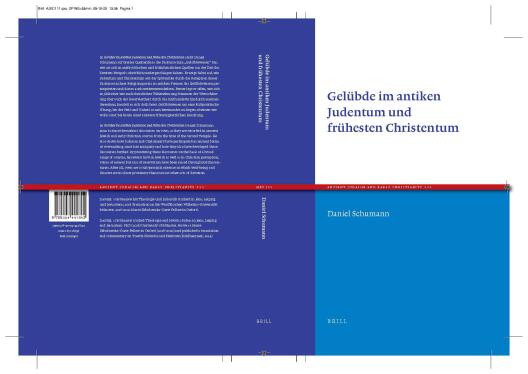
© Brill Dr. Daniel Schumann receives the Hanns Lilje Prize 2020
For his dissertation on "Gelübde im antiken Judentum und frühesten Christentum" written at the Institutum Judaicum Delitzschianum, Dr. Daniel Schumann receives this year's Hanns Lilje Prize of the Göttingen Academy of Sciences. The print version of the dissertation will be published under the same title in December 2020 by Brill in the series Ancient Judaism and Early Christianity. Dr. Schumann worked as a research assistant to Prof. Dr. Lutz Doering at the IJD from 2014 to 2018. We warmly congratulate our former staff member and wish him continued success

© Lutz Doering Excursion to the Jewish Cemetery in Münster
The following report was written by Franziska Prokopetz, who joined the IJD as a Student Assistant in March 2020. She replaces Pauline Reppenhagen, whom we wish all the best for her exams. We warmly welcome Ms. Prokopetz to our team.
פ''נ - "poh niṭman", "Here is hidden". These two words, in abbreviated form, form the beginning of the Hebrew inscription on most tombstones, and each introduces its own biography. On June 29, 2020, students accompanied by Prof. Doering went on an excursion to the Jewish cemetery in Münster to follow these last traces of Jewish life.
During the summer semester, the students had acquired a great deal of knowledge about Jewish burial culture in the exercise on Jewish cemeteries under the guidance of Prof. Doering - from antiquity to the Middle Ages to the present day, from Palestine to Worms and Würzburg to Hamburg-Altona and, of course, Münster. Due to the Corona-conditioned online teaching, however, all in front of the screen. Now, at the end of the semester, they were fortunately offered the opportunity to apply their knowledge for the first time in a direct encounter with the gravestones. The rectorate, the dean's office and, above all, the Jewish community had exceptionally agreed to the visit - subject to the necessary hygiene rules.
The condition of the gravestones, some of which were well over a hundred years old, became an unusual and new challenge when reading the inscriptions. It was all the more helpful that many abbreviations, such as the one above, as well as the general structure of an inscription was by now familiar territory for the participants of the exercise.
Quite new, however, were the biographies, some of them very moving and marked by their respective lifetimes, to which the gravestones examined in more detail referred. In relevant local historical studies, these life stories could be elaborated and are linked, among other information, on the online available documentation Jüdischer Friedhof Münster (http://www.juedischer-friedhof-muenster.de). For example, the story of the Marcus family, who ran a shoe and later an antiques business in Münster: Eli Marcus, who made a significant contribution to the Westphalian dialect with his stage plays and his Low German poetry, lost his son Ernst during the First World War, who, like numerous other Jews, fought for the German Empire. Only fifteen years later, however, Eli Marcus, Münster's once beloved poet, was reviled. He died a forgotten man in 1935.
Rabbi Prof. Dr. Bernhard Brilling as well as Dr. Zwi Sofer, who both researched and taught at the Institutum Judaicum Delitzschianum from the 1950s and 1960s respectively, were particularly remembered. They both were an example to the student group of the challenges, but also the possibilities of Jewish life in Münster after the horrors of the Shoa and also offered the opportunity to get to know a part of the history of the IJD in more detail.
Corona forces us to find new ways
A report on university teaching under the conditions of the pandemic by Laura von Bartenwerffer
When the corona pandemic reached Germany in spring this year, planning for the summer semester 2020 had already been well advanced. We as teachers had designed and announced our courses. Apart from the fine tuning, everything was prepared for the students. But then the start of the semester had to be postponed. And it soon became clear that even after Easter not everything would be able to take place as usual.
Thus, the Faculty of Protestant Theology, and with it the IJD, set out to find suitable means to conduct teaching without classroom sessions. As the IJD team, we tested several video conferencing providers in trial sessions and weighed up their advantages and disadvantages for teaching. A little later, licenses for our favourite platform Zoom were purchased by the university, so that students could work with this program across the university and get used to it quickly. Various possibilities of digital teaching were tested this semester. In addition to the Zoom sessions, other means were used to guide, support, and accompany the students' independent study phases. As a teacher, I have experienced the students' cooperation, and in some cases also their patience, as very positive. We all first had to get used to the other means and ways and try them out. That is why I have also taken some courses offered by the Centre for Higher Education Teaching. Another positive aspect is certainly the survey on digital teaching that the student council conducted among the students. This has strengthened the dialogue between lecturers and students in this unfamiliar situation. It is certainly particularly pleasing that the courses offered by the IJD received positive mention, and that our efforts before the start of the semester have apparently paid off.
However, despite many positive experiences, the certainty remains that classroom teaching cannot be replaced. Both on the side of the students and the lecturers there is a great desire for "normal" attendance sessions after this semester, which most would probably describe as strenuous. This makes it all the more gratifying that it now looks as if we will be able to organise the coming winter semester again, at least in part, in attendance. For my part, however, I hope that we will retain the positive elements from this semester and manage to integrate some ideas into the face-to-face teaching constructively. I can well imagine that some means are suitable to increase the learning success of our students in the long run. We only need the wisdom and also the feedback of the students to recognize these means. So, let's stay in touch - albeit still digitally.
Report on research and teaching in Corona times
John Dik M.A., M.Ed.
Even in Corona times - thank God - research and teaching continue, albeit here and there under more difficult conditions. In the field of research, the most important things are the proofreading of various articles and anthologies that are to be published this year, the reading and translation of ancient texts for my own further education in a collegial circle, research colloquia in an online format, and writing my own dissertation.
In the latter, I am concerned with conceptions of people-God in Jewish and Christian apocalypses after the destruction of the Temple: what about Israel? How does it continue to exist? Who belongs to Israel and who does not? What about the nations and how do they relate to Israel? These are central questions posed in Jewish and Judaeo-Christian circles and have found literary expression in texts such as 2 Baruch, 4 Ezra and the Revelation of John. The particular object of study is how the people of God are constituted on a literary level. Without anticipating too much: In 2 Baruch, the people of God are rallied around the Torah, which is communicated to them by a charismatic prophet - Baruch. In John's Revelation, it follows the Messiah as a lamb-widower. But in 2 Bar, the Messiah also plays a role, and in John's Revelation, the commandments of God.
In the area of teaching, I taught the proseminar on the New Testament (with Greek) in the summer semester of 2020. In this, everything took place via Zoom. Despite the new circumstances and some unfamiliarity, the 30 students quickly settled into the new format, which was supplemented with additional online platforms for assignments and discussion forums. Despite lively participation and a good atmosphere, however, a certain online fatigue is making itself felt, with students hoping to return to face-to-face teaching but trying to integrate the positive aspects of online teaching into it.The next Franz-Delitzsch lecture is postponed to the 29th November 2021
New in the Secretariat of the IJD: Ms. Kerstin Böckenhoff
As of March 15, 2020, Ms. Arnhold's successor, Ms. Kerstin Böckenhoff MA, has started her work in the IJD office.
Ms. Böckenhoff is a trained industrial clerk and has also completed studies in art history as well as classical and early Christian archaeology at the WWU Münster as Magistra Artium.
She comes to us from working for various companies in Münster and the Münsterland region.
We are looking forward to working with her!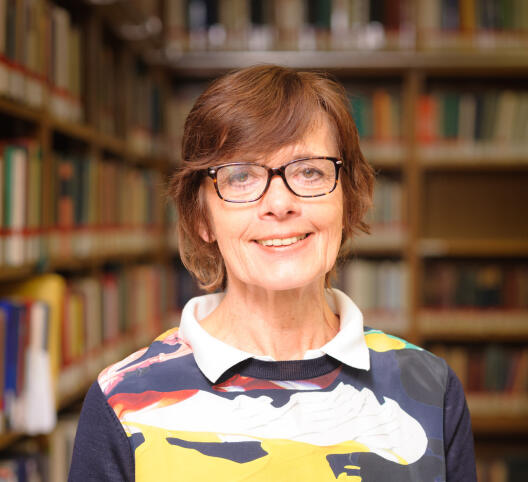
Retirement of Mrs. Arnhold
As of March 31, 2020, the long-time secretary in the IJD office, Ms. Maria Arnhold, has taken a well-deserved retirement. For more than 20 years, Mrs. Arnhold actively and reliably supported the work at the IJD, the public traffic of students, academic guests and visitors from the city society, the contacts with the administration and the Franz Delitzsch Societyand much more.
For many, she was the first contact person when visiting the IJD. Many still fondly remember their encounters with Mrs. Arnhold over the many years.
On March 27, 2020, Ms. Arnhold was given a small retirement ceremony.
Due to the first Corona restrictions already taking effect at that time, the farewell could only be held internally at the institute, and even here only with the necessary distance.
As a gift, we presented Ms. Arnhold with a souvenir book for which staff, postdocs and guests at the IJD from two decades (from Münster to Milwaukee, from Edinburgh to Jerusalem) had designed individual pages, which were then bound together to form a book. The cover was designed by Volker Konrad.The current IJD team says "thank you" and wishes Mrs. Arnhold all the best and God's blessing in her retirement!
Design: Volker Konrad
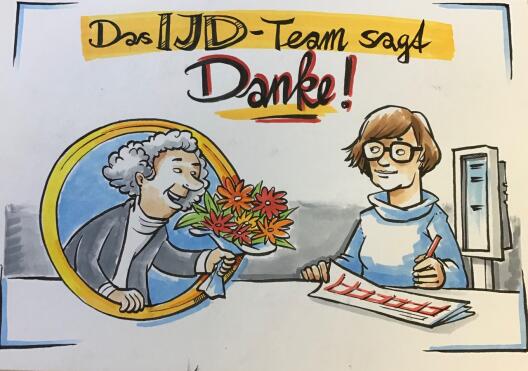
© Volker Konrad 2019
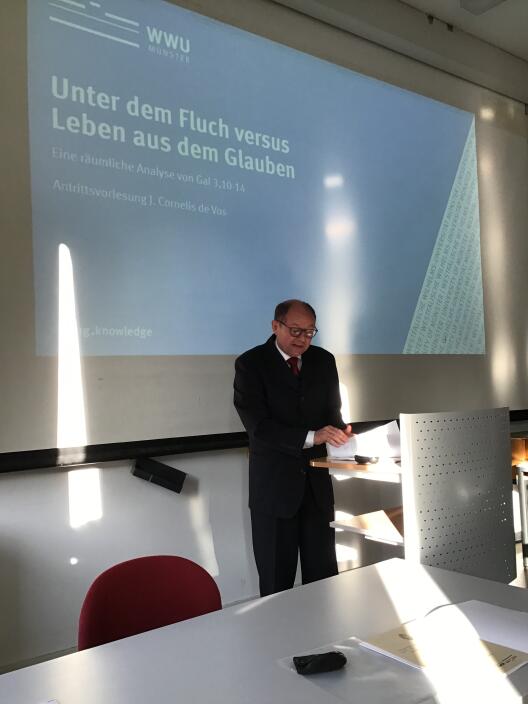
Cor de Vos© Doering Prof. Dr. Cor de Vos’ Inaugural lecture
On Wednesday 23 October 2019, Cor(nelis) de Vos was appointed as professor of the faculty of Protestant Theology. Following the appointment, he gave his inaugural lecture about the topic "Unter dem Fluch versus Leben aus dem Glauben. Eine räumliche Analyse von Gal 3,10–14“.
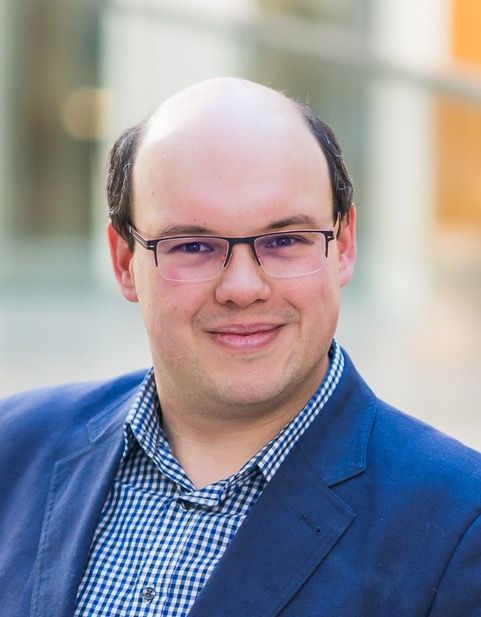
Bärry Hartog© Bärry Hartog Dr. Bärry Hartog (Groningen) is Humboldt Research Fellow at the IJD (2019–20), hosted by Professor Doering
From October 2019 until September 2020, Dr. Bärry Hartog will be residing as Humboldt Postdoctoral Fellow at the Institutum Judaicum Delitzschianum, hosted by Prof. Dr. Lutz Doering. Hartog studied Theology and Semitic Languages in Leiden and obtained his PhD from KU Leuven in 2015. He is currently a Postdoctoral Researcher at the Protestant Theological University in Groningen, the Netherlands.
Dr. Hartog’s main research interests are ancient Judaism in the context of the Graeco-Roman world, ancient textual scholarship, and the formation of identity in complex societies. During the tenure of his Humboldt, he will be working on a project called “Identities on the Move: Jewish, Christian, and Greek Travel Narratives from the Early Roman Empire.” This project investigates the connection between descriptions of travel, intercultural encounters, and the cultural and religious identity of the protagonists in travel narratives from the 1st–3rd centuries CE. By investigating these topics, the project aims to illuminate how inhabitants of globalised spaces (such as the early Roman empire) write themselves into these spaces whilst also upholding the distinctiveness of their own traditions.
Identities on the Move: The First Six Months
Bärry Hartog
I used my first six months in Münster to develop the focus for my new project. Close readings of the Acts of the Apostles, combined with the wealth of sources in the Münsteraner libraries (some of which are not, or not as easily, available in the Netherlands), helped me to clarify my argument and to identify several levels on which processes of “glocalisation” shine through in Acts. The Corona crisis interrupted my access to libraries, but it did give me the opportunity to work on several articles, which are currently under review with professional journals. In what remains of my Humboldt Fellowship, I will finish my chapter on Acts and plan the contents and argument of the rest of the monograph, so that I can work towards finishing that once I am back in Groningen.
David Nirenberg© Doering Prof. Dr. David Nirenberg (Chicago) talks about Judaism, Christianity and Neighbourhoods in the Longue Duree
Franz Delitzsch Lecture on 2 December 2019, 18 c.t., Fürstenberghaus, lecture hall F4
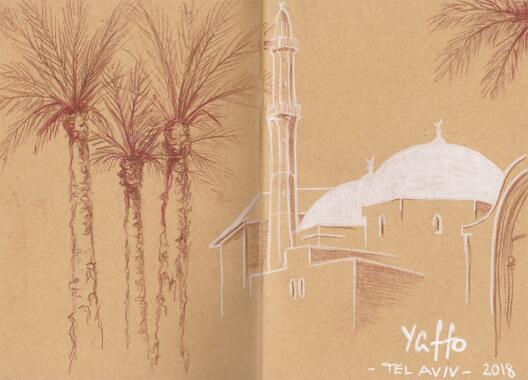
© Carolin Dodt 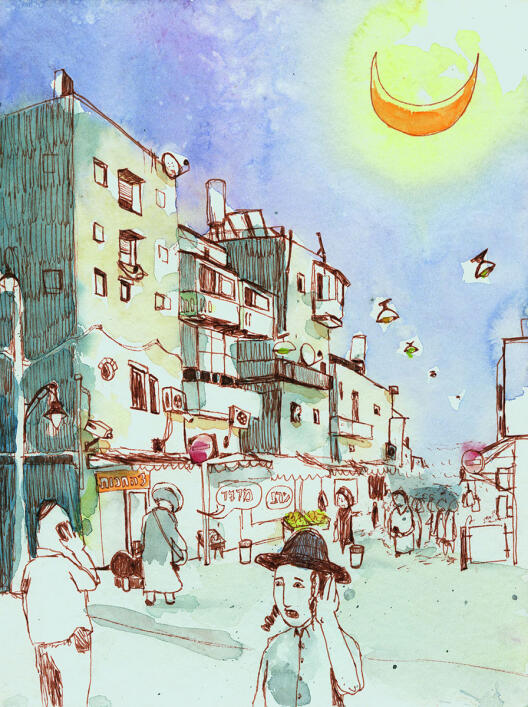
© Jacob de Boer 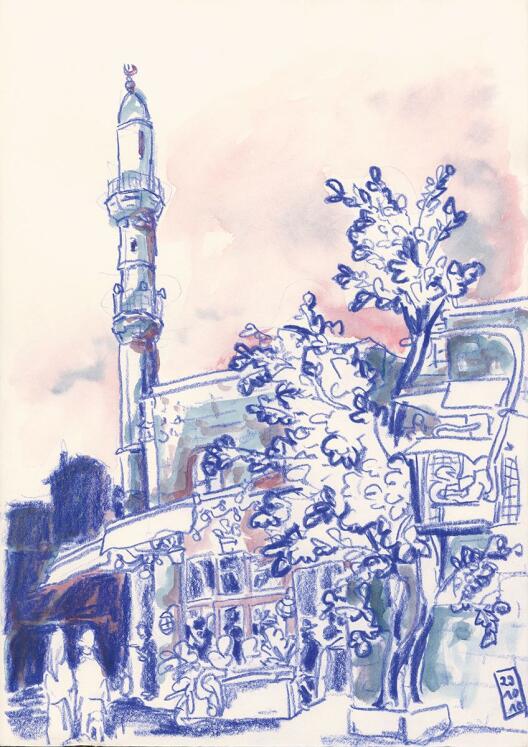
© Varina Wagner 
© Ursus Haaben New exhibition in seminar room of the IJD
Tel Aviv – sketches and aquarelles, Excursion of the FB Design to Tel Aviv and Jerusalem 2018
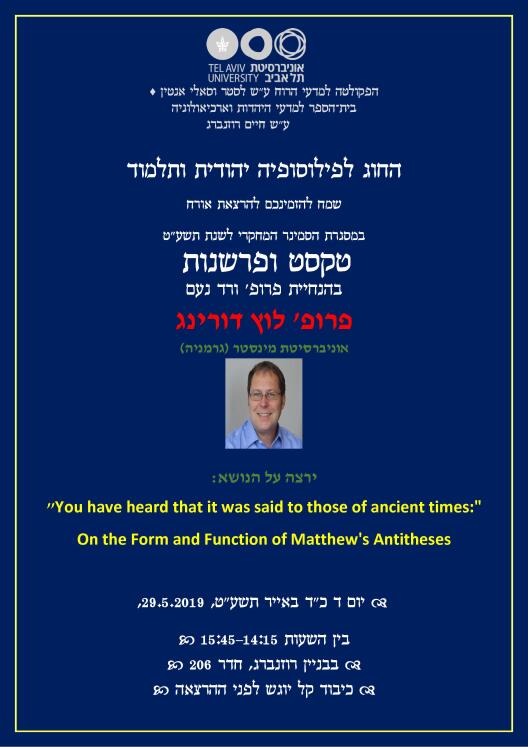
© Doering Prof. Doering gives two papers in Israel
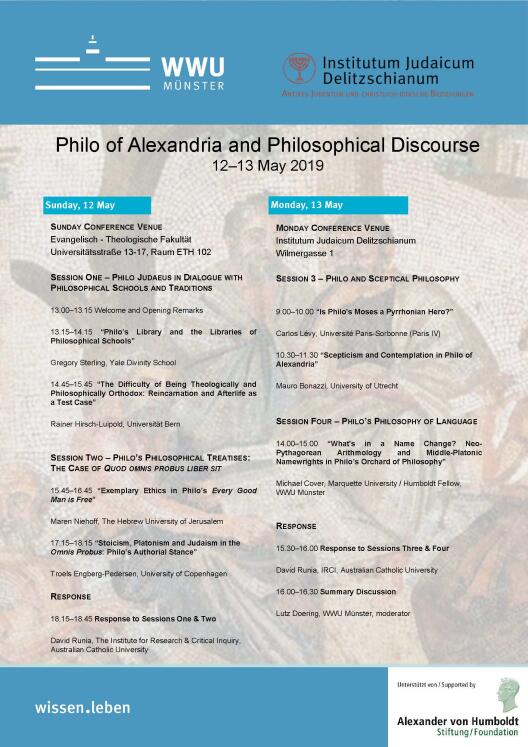
© Doering 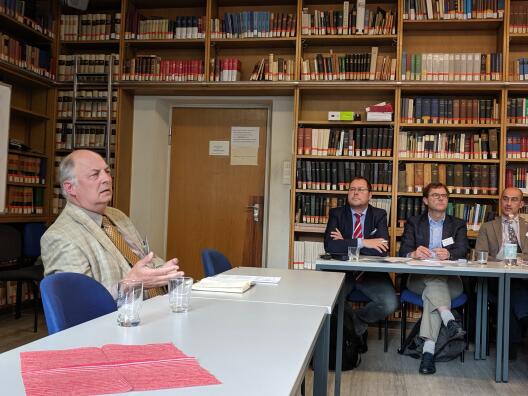
© Doering 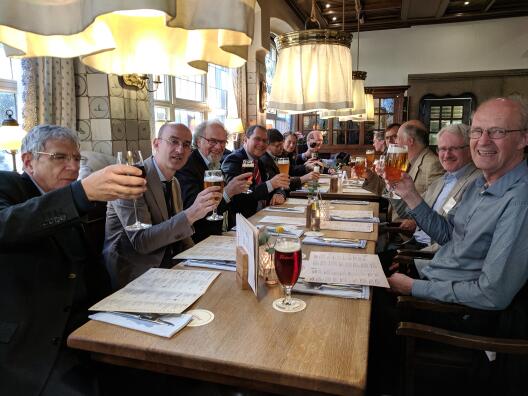
© Doering REPORT ON THE WORKSHOP, “PHILO OFALEXANDRIA AND PHILOSOPHICAL DISCOURSE”, MÜNSTER, 12–13 MAY 2019
“Philo of Alexandria and Philosophical Discourse,” an international conference on Philo’s debt to and appropriation of Hellenistic and Roman schools of philosophy, took place 12–13 May 2019 at the Westfälische Wilhelms-Universität in Münster. The conference, organized jointly by Assistant Professor Dr. Michael Cover (Humboldt Fellow at the Institutum Judaicum Delitzschianum, WWU Münster / Marquette University) and Professor Dr. Lutz Doering (Institutum Judaicum Delitzschianum, WWU Münster), included international experts on Philo and ancient philosophy from three continents and eight different countries. The conference, planned in connection with Dr. Cover’s Humboldt Fellowship and supported primarily by funds from the Alexander von Humboldt-Stiftung in Bonn, had the dual aim of advancing Cover’s Humboldt project and providing the groundwork for a larger Sammelband, including an even wider range of scholarly contributions.
The first day of the conference consisted in two sessions. Papers in session one aimed to locate Philo within his larger scholarly and religious landscape. The paper by Gregory Sterling (Yale University), “Philo’s Library and the Libraries of Philosophical Schools,” provided a new reconstruction of all the works that Philo likely had in his private library and then made some inferential conjectures about the way a philosophical school setting might have influenced the composition of Philo’s works. Rainer Hirsch-Luipold (Universität Bern), in his paper “The Difficulty of Being Theologically and Philosophically Orthodox: Reincarnation and Afterlife as a Test Case,” situated Philo’s philosophical thought within the matrix of religious Platonism. Session two focused on a single Philonic treatise, Quod omnis probus liber sit. Maren Niehoff (The Hebrew University), in a paper entitled “Exemplary Ethics in Philo’s Every Good Man is Free,” situated Philo’s use of exemplaric proofs in the latter half of the work within broader patterns of Stoic psychagogy including Cicero and Seneca). Niehoff argued that Philo’s Quod omnis probus liber sit belongs to his later Roman period, in which the influence of Stoicism can be more heavily felt. Finally, Troels-Engberg Pedersen (University of Copenhagen; “Stoicism, Platonism and Judaism in the Omnis Probus: Philo’s Authorial Stance”) offered a complementary reading of the same treatise, reechoing elements of Niehoff’s analysis, while also suggesting a greater influence of Platonism in the final shape of the work.
The second day of the conference began with a third session on Philo and ancient philosophical scepticism. Carlos Lévy (Paris-Sorbonne) presented a paper related to a current larger project, which argues for Philo’s philosophical debt toscepticism (“Is Philo’s Moses a Pyrrhonian Hero?”). Drawing particularly on Pyrrhonian sources, Lévy advanced the thesis that Philo’s understanding of the human person as oudeneia (as a “nothing”) represents, along with his Judaism, a first-order orientation in his thought. Turning from ethics to metaphysics and here to the topic of contemplation, Mauro Bonazzi (University of Utrecht), in his paper “Scepticism and Contemplation in Philo of Alexandria,” investigated how Philo’s commitment to epistemological modesty regarding knowledge of God might have shaped his understanding of the human good.
The final session was devoted to a single paper, Michael Cover’s contribution on Philo’s philosophy of language (“What's in a Name Change? Neo-Pythagorean Arithmology and Middle-Platonic Namewrights in Philo’s Orchard of Philosophy”). The paper offered a close reading of Philo’s philosophical defense of Gen 17:5 (God’s gift of a new name to Abram) in two exegetical series, the Quaestiones in Genesin and the treatise On the Change of Names as part the Allegorical Commentary. While in the former Philo uses a combination of Neo-Pythagorean, Middle-Platonist, and Stoic philosophies of language to defend God’s gift of the “letter” (in Greek an alpha is added to yield “Abraam”), in the latter he moves to a position according to which the gift is rather a new power in the soul.
In addition to lively moderated questions and answers after each paper, David Runia (IRCI, Australian Catholic University), in his capacity as invited respondent, offered feedback and fielded questions from speakers in all four sessions. The conference organizers are currently soliciting further contributions to round out the volume. The proceedings will be submitted for review with a respected publishing house.
Michael Cover
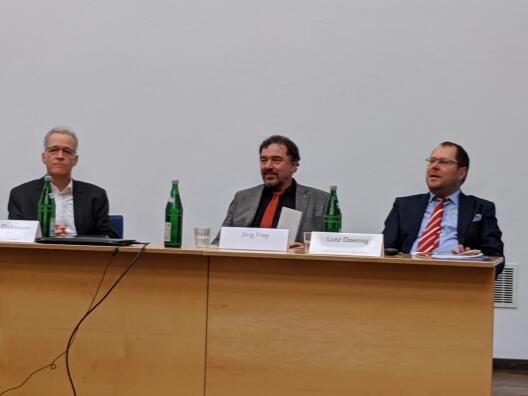
© Doering 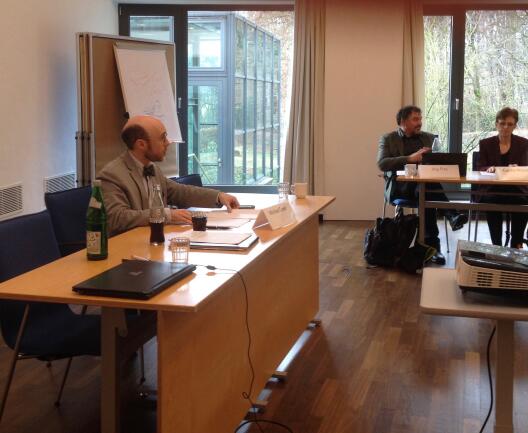
© Doering Qumran conference assembles international audience in Schwerte
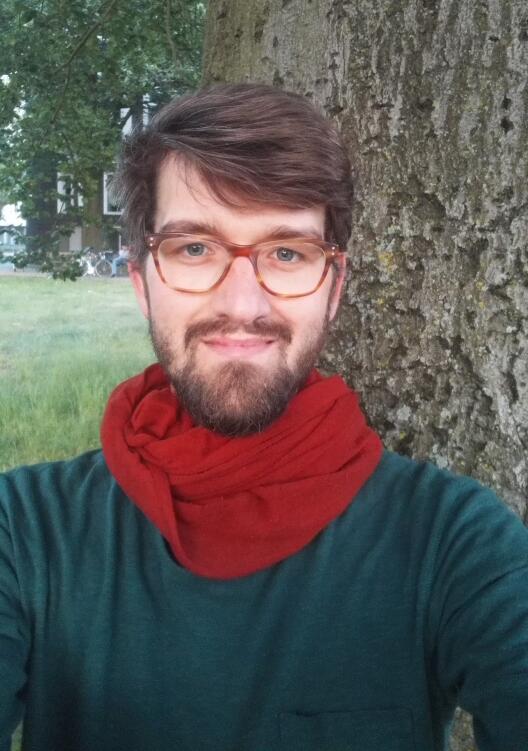
© Florian Neitmann New PhD student in the Apocalyptic Project
Since November 1, 2019, Mag. Theol. Florian Neitmann is a doctoral student in the research project "Transkulturelle Verflechtungen und Entflechtungen jüdischer Apokalyptik" in the Cluster of Excellence Religion and Politics at WWU. The aim of the project, which is directed by Prof. Dr. Lutz Doering and carried out in cooperation with Prof. Dr. Michael Segal from the Hebrew University of Jerusalem, is to explore in more detail the relationships between Jewish apocalyptic and Greek, Roman and Near Eastern texts and traditions. Mr. Neitmann's dissertation is devoted to the topic of "Gesetz und Gericht im 4. Esra- und 2. Baruchbuch". He has already presented some results of his work at the Research Colloquium New Testament and Ancient Judaism on "Das Gesetz im 4. Esrabuch" on June 10, 2020. Florian Neitmann studied Protestant Theology in Münster and Göttingen and participated in the program "Studium in Israel" at the Hebrew University; thus, the project leads him back to Münster and Jerusalem.
Lines of "Levant"
- a new exhibition in the IJD
2018
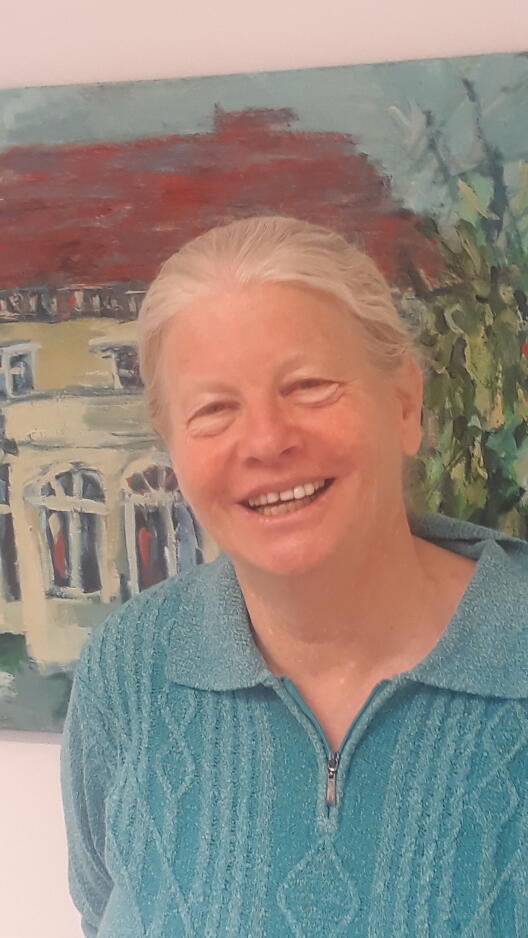
Tal Ilan© Doering Franz-Delitzsch-lecture 2018
- Prof. Dr. Tal Ilan (Berlin) "Jüdische und christliche Philologie, die Frauen zumSchweigen bringt – Die Königin und die Apostelin
(translated: Jewish and Christian philology, which silences women – the queen and the apostle)
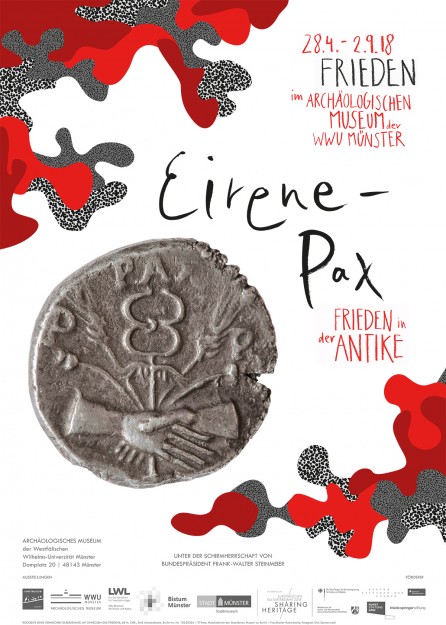
© Doering 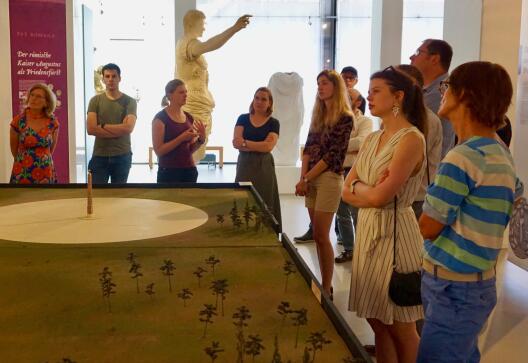
© Doering 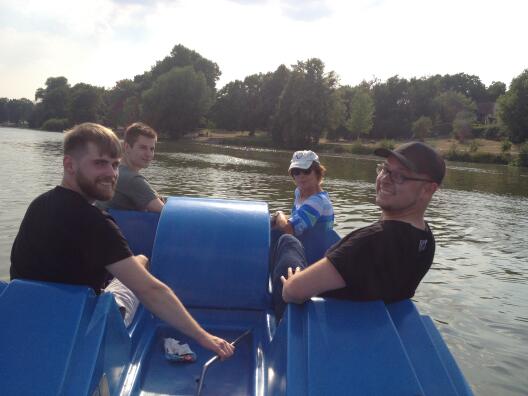
© Doering 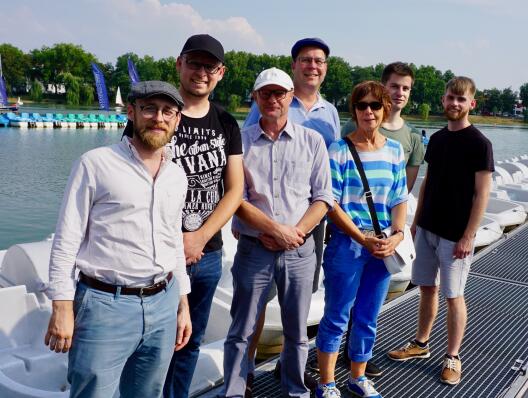
© Doering Joint visit with the New Testament Seminar of the Peace exhibitions
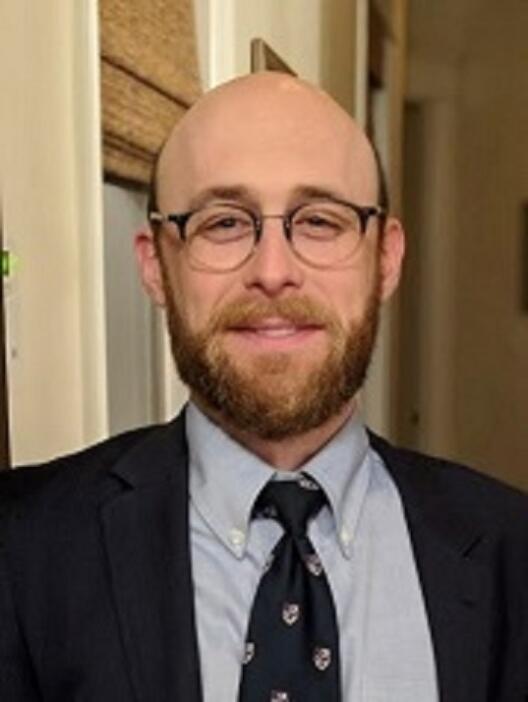
Dr. Michael Cover© Michael Cover Dr. Michael Cover- Humboldt Research Fellow with Prof. Doering at the IJD (2018-2019)

